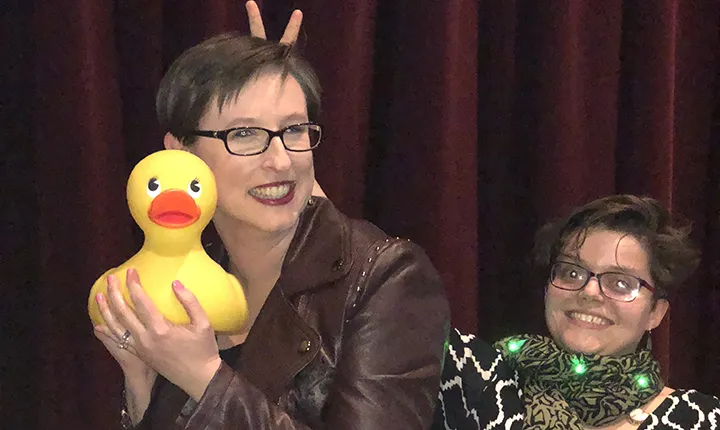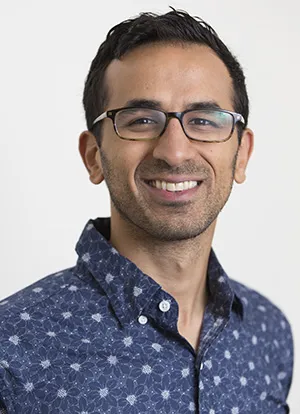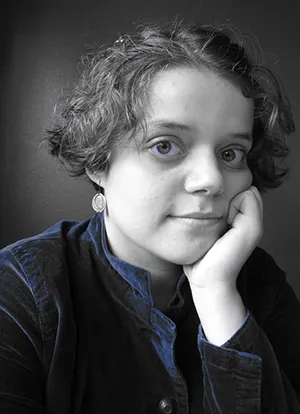Humanities Reclaims Glory, Rubber Duck at 2018 Bathtub Debate

For the second time in three years, Assistant Professor of Philosophy Krista Thomason claimed the coveted rubber duck for Humanities.
Represented by Assistant Professor of Philosophy Krista Thomason, the Humanities dominated the 2018 Bathtub Debate, reclaiming the prized rubber duck from the Social Sciences.
Presented by the Peaslee Debate Society, the Bathtub Debate is an annual showdown between professors from each of the three academic divisions, which imagines an apocalyptic scenario only one of the divisions can survive. Nate Urban ’18, an Honors political science major from Swarthmore, Pa., served as moderator.
Joining Thomas on stage, Assistant Professor of Economics Syon Bhanot spoke for the Social Sciences, while Assistant Professor of Computer Science Lila Fontes argued for the Natural Sciences. Discussion centered on a flood of biblical proportions and unknown origins. Which division deserves the single raft to escape it?

Assistant Professor of Economics Syon Bhanot represented Social Sciences.
Bhanot spoke first, presenting a humorous denigration of departments within the other two divisions. He mocked modern art, dubbed Shakespeare “incomprehensible” and “pointless,” and described Film and Media studies as watching movies with friends and forming a drunken opinion. Moving on to the Natural Sciences, Bhanot outlined their uselessness; one goal of advanced math, he pointed out, is finding the next biggest prime number.
Bhanot finished his opening by defining the merits of the Social Sciences. He argued that his division focuses on problems involving people and that “what makes life valuable is that there are other people around.” In reference to his performance at the 2016 Bathtub Debate during which he was unaware that Linguistics belongs to his division, Bhanot repeatedly stated, “Linguistics is a social science,” but offered no further comment on the matter.
Professor Fontes spoke next, focusing her argument on the specific scenario. “There has been a flood which has covered the surface of the earth,” she explained. “That’s a lot of water. We should definitely figure out where the water came from.” She argued that we need scientists to figure out how this flood developed and asked, “Could we build, I don’t know, a second boat?” Scientists will help us survive, Fontes insisted, by helping us create potable water and find food. As long as we survive, we can reconstruct the other divisions.
Professor Thomas, another Bathtub Debate alum who won victory for the Humanities in 2016, insisted that the Humanities are the best division to task with rebuilding civilization. Neither of the other divisions have experience creating civilization, but the Humanities had already established themselves before the other divisions were “even out of diapers,” she stated. “Turns out, the humanities and the arts have a pretty great track record” when it comes to rebuilding civilization.

Assistant Professor of Computer Science Lila Fontes was the Natural Sciences representative.
Thomason added that members of the Humanities have scientific skills, as well. Artists are also chemists and architects; digital humanists understand technology. In fact, she explained, the other divisions got their ideas from the humanities. “We can cover what they can cover; can they cover what we cover?” she wondered. Thomason finished by insisting that the Humanities are the most fun. “Who do you wanna be stuck on a boat with?” she asked. “There are no economies on the boat; what are the economists going to do? There are no labs on the boat.” All that humanists need for entertainment are books, she said.
Following their opening arguments, the professors fielded questions from the audience. Discussion ranged from how to mediate conflict between individuals on the boat to how to keep the Humanities’ books from getting wet, to strategies for survival, at which point Professor Bhanot jokingly advocated for organized cannibalism.
Finally, Thomason, Fontes, and Bhanot presented their closing arguments. Thomason reemphasized the civilization-building power of the Humanities, Fontes suggested digitizing everything to save culture, and Bhanot explained that the study of scarcity is an established field of research within the social sciences that would prove useful in this scenario. He proposed “leveraging the knowledge we do have” to survive the flood.
Voting took place in two rounds. First, audience members raised their hands to vote for their favored divisions. However, when the Humanities and Natural Sciences wound up tied, Urban used an “applausometer” app on his phone to judge the volume of cheering that the two remaining divisions received. The Humanities, buoyed by roaring applause, screaming, and foot-stomping, claimed victory and Thomason once again left with the rubber duck.



